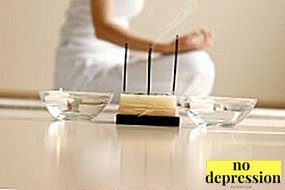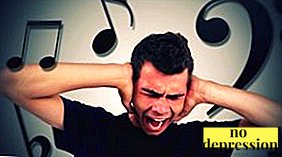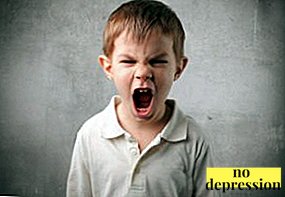The presence of obsessive thoughts in medical practice called obsessive compulsive disorder. To a certain extent, all people are prone to this condition, especially those who have experienced traumatic situations.
Establishing a diagnosis of OCD depends on the severity of obsessive ideas. Patients with this syndrome are obsessed with negative thoughts and constantly take actions to prevent the danger (compulsion).
Obsessive-compulsive disorder in adults should definitely be treated. Otherwise, there is a risk of developing phobias and deviations of the nervous system. The question of how to get rid of obsessive thoughts, includes many solutions to the problem.
How does obsessive compulsive disorder manifest?

OCD manifests itself in the form of intrusive thoughts in conjunction with actions aimed at preventing an event that is object of fear.
Obsessions and compulsions can exist separately from each other.
Those. in some cases, the patient is constantly thinking about danger, in others - pronounced constantly repeated actionsthirdly, there is a combination of obsessive ideas and the implementation of measures to prevent them.
Obsessive-compulsive disorders can manifest in the form of the following conditions:
- Hypertrophied Cleanliness (the patient constantly thinks about the risk of infecting himself or his relatives with pathogenic microorganisms, the person is obsessed with cleaning, constantly washes his hands and carries out other hygiene measures).
- Exaggerated perfectionism (all occurring situations and actions should be reproduced according to a specific algorithm, errors are not allowed).
- Pathological placement of objects in a certain sequence (the object of obsessive thoughts can be specific or any objects from the environment, for example, books should stand in alphabetical order, objects on the table should follow a certain trajectory or according to physical signs, etc.).
- Intrusive account (the patient regularly counts certain objects or everything that he sees, for example, steps on the stairs, people on the street, objects on the table, etc.).
 Pathological gathering (a person may begin to collect items of importance which are in doubt, for example, newspaper clippings, in which there is no important information, advertising leaflets, etc.).
Pathological gathering (a person may begin to collect items of importance which are in doubt, for example, newspaper clippings, in which there is no important information, advertising leaflets, etc.).- Hyperbolic sense of danger (the degree of danger of ordinary situations or objects is greatly overestimated).
- Obsessive craving (The patient can not control the desire to perform certain actions, while he may be aware of their uselessness or groundlessness).
- The occurrence of phobias (constant fear of certain events, unreasonable feeling of anxiety and panic attacks at the moment of collision with a potential danger).
How to treat obsessive neurosis?
The main treatments for obsessive-compulsive disorders are psychotherapy and social rehabilitation. In the absence or delayed tendency to normalize the mental state of the patient, therapy can be supplemented with the use of special medications.
The presence of complications and persistent mental disorders can be the basis for hospitalization of a patient with OCD. Social rehabilitation is carried out after the course of therapy.
Options for the treatment of obsessive-compulsive disorders:
- Cognitive-behavioral therapy (the basic principle of treatment lies in the patient's awareness of his disorder and the development of the desire to cope with the illness, experts select methods of therapy depending on the individual clinical picture of the person's health status).
 Individual and group classes with a psychologist (such methods of therapy are among the most effective methods, in the process of training the specialist determines the extent of the patient's psyche and gradually eliminates unreasonable fears).
Individual and group classes with a psychologist (such methods of therapy are among the most effective methods, in the process of training the specialist determines the extent of the patient's psyche and gradually eliminates unreasonable fears).- Hypnosis (this technique should be carried out only by a professional, according to medical statistics, hypnosis is one of the most effective ways of getting rid of numerous mental disorders, including OCD).
- Method "stop thought" (the patient is invited to recall the manifestation of OCD, then the situation is sorted out in detail, during the course of the activity the person is aware of the groundlessness of his fears).
How to get rid of obsessive thoughts and OCD? Find out from the video:
Is it possible to cure yourself at home?
It is extremely difficult to get rid of obsessive-compulsive disorder on your own. This ailment is a mental disorder.
Such pathological conditions imply the use of certain psychotherapy techniques. If OCD present in mild degreethen some exercises can be quite effective, but they should be done daily and with a high degree of responsibility.
When treating OCD at home You can use the following recommendations:
 Study of information about obsessive-compulsive disorders (numerous printed sources fully explain the causes of OCD, their symptoms and ways of elimination).
Study of information about obsessive-compulsive disorders (numerous printed sources fully explain the causes of OCD, their symptoms and ways of elimination).- If you identify any OCD symptoms, it is recommended to seek help from a specialist, but you can try some exercises at home.
- Mastering the technique of respiratory gymnastics (owning such a technique especially helps to eliminate OCD symptoms at the time of their exacerbation).
- Getting rid of bad habits (people who abuse alcohol and smoke are at risk of OCD).
- Normalization of the diet (regular feeling of hunger or a sharp decrease in blood sugar can provoke a stressful state, OCD will worsen).
- Compliance with sleep and wakefulness (mental and physical fatigue increases the risk of OCD).
- Regular physical activity (sport has a beneficial effect not only on the body, but on the psycho-emotional state of a person).
Drug treatment
Treatment of OCD without medication is permissible only in mild forms mental disorder.
In most cases, the use of drugs to normalize the nervous system becomes an integral part of therapy.
The duration of administration of such agents and dosages directly depend on the degree of damage to the patient’s psyche and the intensity of OCD symptoms. Drugs must be selected. only by a qualified technician.

The following can be assigned to OCD types of drugs:
- tranquilizers (Clonazepam, Diazepam);
- anxiolytics (Buspirone, Clonazepam);
- agents from the category of atypical antipsychotics (risperidone);
- atypical antipsychotics (lamotrigine, olanzapine);
- antidepressants (fluoxetine, paroxetine, fluvoxamine, sertraline);
- drugs category normottimikov (Lithium carbonate, Normotim).
Phenibut
Phenibut tablets refer to categories of tranquilizers. This drug is widely used as a sedative for various neuroses.
For the treatment of obsessive-compulsive disorders, Phenibut can be prescribed as an adjunct to the main course of treatment.
The drug is considered obsolete and in most cases, experts replace it. more modern and improved medicines.
Antidepressants

Antidepressants is an integral part of therapy obsessive compulsive disorders.
The initial stage of treatment is the appointment of such drugs for two or three months.
Further therapy will depend on the trend towards recovery.
In some cases, it is possible to overcome the disease only with antidepressants, and there is no need to supplement the drug treatment of OCD with potent drugs.
Features of use antidepressants:
- the minimum course of therapy is two months;
- improvement in the patient’s condition is manifested during the third week of taking the drugs;
- specific types of antidepressants are selected by a doctor (you cannot make a decision about taking a particular drug yourself).
How to drive out obsessive melodies from your head? Scientists answer:
Practical advice
In the initial stages of obsessive-compulsive disorder, you can take practical advice from experts. If you do not manage to overcome obsessive thoughts on your own, then an appeal to a specialist will be inevitable.
 The easiest way to win OCD, due to the specific situation.
The easiest way to win OCD, due to the specific situation.
Such disorders in most cases are temporary and are eliminated when the patient’s psychoemotional state normalizes.
How to get rid:
- From obsessive thoughts about a man, about a man (Psychologists consider low self-esteem to be the main cause of obsessive thoughts about a man. You can only overcome this type of OCD with targeted self-confidence, you should additionally exclude provocative factors, for example, remove photos or objects reminiscent of their owner).
- From obsession (you should gradually get rid of obsessive ideas, first you need to realize the groundlessness of your actions, then deal with them step by step, for example, if you want to check the door several times, do it once and try to distract from trying to repeat the action).
- From obsessive bad thoughts (it is necessary to try to develop the habit of “not letting” bad thoughts into your head; at the moment of their occurrence, you need to be distracted as soon as possible and think about pleasant events, gradually mastering this skill will give good results).
- From bad memories (first of all, it is necessary to get rid of all objects that cause bad memories, then it is important to realize that the event has passed and not to repeat, good methods of distracting from bad thoughts are reading, watching your favorite movies or hobbies).
 From obsessive melodies in my head (If an obsessive melody delivers discomfort, then you can listen to it from beginning to end, if the method did not help, then you need to distract yourself with logical tasks, such as crossword puzzles or puzzles, the brain will concentrate on solving them and the obsessive melody will stop bothering them).
From obsessive melodies in my head (If an obsessive melody delivers discomfort, then you can listen to it from beginning to end, if the method did not help, then you need to distract yourself with logical tasks, such as crossword puzzles or puzzles, the brain will concentrate on solving them and the obsessive melody will stop bothering them).- From obsessive thoughts about death (such thoughts may arise not only against the background of a poor life, but also among successful people, first of all, it is necessary to understand the cause of fear, then identify moments in your life that you would like to change, you will need to try to fix it, if such methods did not help, you have to go to a specialist, the fear of death is among the most persistent neurotic disorders).
How to remove obsessive thoughts about your loved one? Find out from the video:
Is OCD treated completely forever?
With timely treatment, the prognosis for a patient with OCD will be favorable. On average, treatment of the disorder takes one year. During this time, it is possible to fully restore the psycho-emotional state of a person. Relapse pathologists are excluded.
If therapy was delayed or incomplete, OCD may become chronic. Symptoms of obsessive thoughts will occur regularly in a patient.
With each exacerbation of OCD, appropriate psychotherapeutic procedures will have to be carried out and drugs taken to correct the psycho-emotional state.
Prognosis for obsessive compulsive disorders depends on the following factors:
 timeliness of diagnosis and therapy;
timeliness of diagnosis and therapy;- full compliance with the recommendations prescribed by the doctor;
- the use of additional methods of therapy (home exercises);
- patient's desire to get rid of the disease and awareness of the problem.
Obsessive Compulsive Disorders may be temporary or permanent. If obsessive thoughts or movements begin to cause discomfort and become noticeable to others, then you should not postpone an appeal to a specialist. Otherwise, there is a risk of serious complications.
How to deal with thoughts of suicide or death? Psychologist tips:

 Pathological gathering (a person may begin to collect items of importance which are in doubt, for example, newspaper clippings, in which there is no important information, advertising leaflets, etc.).
Pathological gathering (a person may begin to collect items of importance which are in doubt, for example, newspaper clippings, in which there is no important information, advertising leaflets, etc.). Individual and group classes with a psychologist (such methods of therapy are among the most effective methods, in the process of training the specialist determines the extent of the patient's psyche and gradually eliminates unreasonable fears).
Individual and group classes with a psychologist (such methods of therapy are among the most effective methods, in the process of training the specialist determines the extent of the patient's psyche and gradually eliminates unreasonable fears). Study of information about obsessive-compulsive disorders (numerous printed sources fully explain the causes of OCD, their symptoms and ways of elimination).
Study of information about obsessive-compulsive disorders (numerous printed sources fully explain the causes of OCD, their symptoms and ways of elimination). From obsessive melodies in my head (If an obsessive melody delivers discomfort, then you can listen to it from beginning to end, if the method did not help, then you need to distract yourself with logical tasks, such as crossword puzzles or puzzles, the brain will concentrate on solving them and the obsessive melody will stop bothering them).
From obsessive melodies in my head (If an obsessive melody delivers discomfort, then you can listen to it from beginning to end, if the method did not help, then you need to distract yourself with logical tasks, such as crossword puzzles or puzzles, the brain will concentrate on solving them and the obsessive melody will stop bothering them). timeliness of diagnosis and therapy;
timeliness of diagnosis and therapy;

